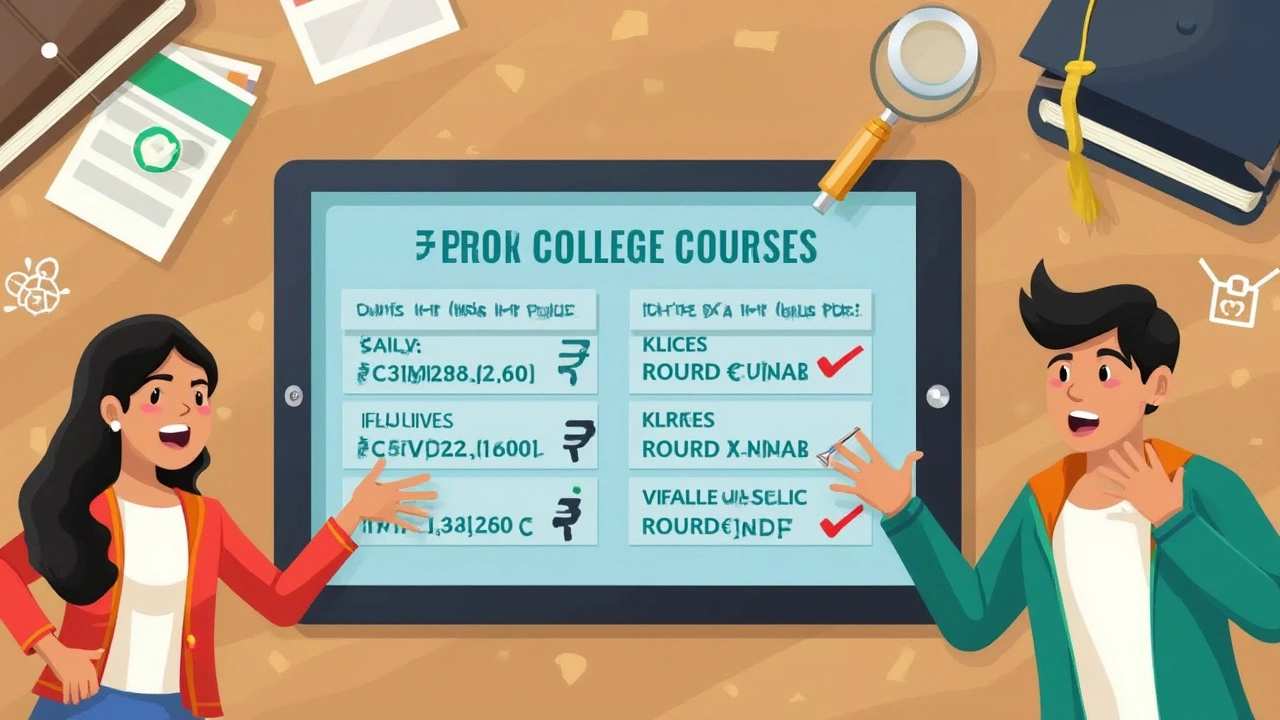Cheapest College Course: Your Fast Track to Affordable Online Learning

You can pay less than the price of a takeout pizza for a real college course online. Sounds crazy, right? But that’s the reality in 2025 — the online course scene is insanely competitive, and a lot of schools and platforms are dropping their prices to grab students’ attention.
Before you jump in, it helps to know what “cheapest” really means here. Are we talking about free courses with a catch, pay-what-you-want deals, or rock-bottom prices that still get you some actual college credit? There’s a difference, and picking the right option can save you more than just cash. Some people land solid jobs or transfer to a dream school because of smart course choices—not just cheap ones.
I’ve seen plenty of friends, including my own wife Fiona, crush through affordable online classes to unlock career doors. It’s possible, but only if you know where to look and don’t fall for deals that sound too good to be true. So, how do you spot the real bargains and skip the ones that aren’t worth your time? Keep reading. I’ll break down the types of cheap courses out there, tell you where to dig for deals, and show you tricks to make sure you get your money’s worth.
- Defining Cheap: What Counts as the Cheapest College Course?
- Where to Find the Cheapest College Courses Online
- Hidden Traps: Are the Cheapest Courses Worth Your Time?
- Smart Tips for Getting the Best Value in Online Courses
Defining Cheap: What Counts as the Cheapest College Course?
So, what exactly is the cheapest college course when you’re looking online? To figure this out, you have to look at a few things. Price is obviously the main factor, but it's not the whole story. Some courses are labeled "free," but then you realize you need to pay for a certificate, grab some paid textbooks, or buy add-ons to get real value. Others might have a low upfront fee but get expensive with hidden costs.
Authentic cheap online college courses include places where you can get actual college credits for a super low price. For example, platforms like Saylor Academy and Sophia Learning offer self-paced, fully online college-level courses for $25 to $79. StraighterLine is another well-known name; a basic course like College Algebra can run $59, but you pay a monthly membership that starts around $99/month, so you can hustle through multiple courses in one month and really save.
Here's how to tell if a course is truly cheap and worth your effort:
- Upfront Cost: Is the advertised price really all you’ll pay, or are there surprise fees?
- Credit Transfer: Does your target college actually accept the credits from this course? $30 is still too much if you can’t use it.
- Material Access: Does the price include everything—lectures, quizzes, texts—or do you have to buy extras?
- Completion Requirements: Can you work at your own pace, or will monthly fees add up?
Keep in mind, some big names like Coursera or edX do offer free-to-audit courses, but the second you want a certificate or transferable credit, you’ll likely pay anywhere from $39 to $300. That’s a huge range.
Basically, the "cheapest" course is the one where you get real, useful results for the smallest out-of-pocket cost—with no nasty surprises down the line. Check for partnerships, reviews, and schools actually accepting these credits. Otherwise, you might end up earning a cheap certificate that nobody cares about.
Where to Find the Cheapest College Courses Online
If you’re after the cheapest college course, you have more real options than ever before. Tons of platforms and a handful of actual universities are offering courses for the cost of a fast-food combo meal. Here are the places that give you the most for your money without running into shady sites or bad info.
- edX and Coursera: They team up with big name schools (like Harvard, Yale, or Google for job-based certification) and put out free-to-audit courses. If you want a real certificate or transferable credits, you pay—sometimes as low as $30–$50. Both sites also have micro-degree and professional certificate programs a fraction the cost of traditional college.
- Community College Online Programs: These aren’t giant internet platforms, but don’t overlook them. Places like Rio Salado College and Coastline Community College have hundreds of fully online classes. Their tuition can run below $100 per credit hour for in-district students, and lots of their classes transfer directly to state universities.
- Saylor Academy: This nonprofit offers self-paced courses with zero tuition. The trick is, if you want actual accredited college credit, you pay $25 per final exam. They have direct partnerships with schools like Thomas Edison State University, making it a killer option for knocking out general ed.
- Study.com and StraighterLine: Straight-up college courses for a flat monthly fee—typically around $99/month. Pass the class, and transfer the credit to one of 100+ partner colleges. If you’re quick and motivated, you can finish a handful of classes in just one month and pay way less than at a regular college.
- Modern States: Their "Freshman Year for Free" project actually pays your test fees if you prep for CLEP exams through their free courses. This can knock an entire year off your tuition bill if you pass enough exams.
Watch out for sites that promise ‘fully accredited’ classes at super-low prices but don’t have real reviews or partnerships with known colleges. Stick to providers with transfer guarantees or direct partnerships with real schools. That way, your effort actually counts toward a degree, not just a piece of paper for your wall.

Hidden Traps: Are the Cheapest Courses Worth Your Time?
Cheap online courses look like a steal, but not all of them pay off. Tons of sites flash prices that seem too good to be true—sometimes they really are. Before you sign up, check if the course gives you anything worth putting on your resume or using as college credit. A lot of the lowest-priced deals come with fine print or zero support, so you’re on your own if you get stuck.
Accreditation is the big one. If a course claims to offer college credit but isn’t linked to a school recognized by the Council for Higher Education Accreditation or the U.S. Department of Education, don’t count on your credits transferring. No employer or university is impressed by a certificate from a sketchy site. For example, you can find super cheap courses on some freelance marketplaces, but most of those aren’t recognized by any real schools.
Here are the biggest gotchas to watch out for:
- Cheapest college course promises, but only delivers a PDF "certificate" with no credibility.
- No support. Some platforms drop you into pre-recorded video dead zones with no real teachers to ask for help.
- Hidden fees. Sometimes the course is cheap, but you find out you have to pay again to get a certificate or access the final exam.
- No refund policy. If you realize in week one the course is junk, you might be out your money.
I’m not saying every cheap class is a scam. Actually, there are plenty of solid low-cost options, especially through well-known platforms like Coursera, edX, or community colleges. Those usually have at least some kind of support and sometimes even transferable credits. But double check details—it’s on you to make sure what you’re getting actually matches what you need. It’s totally worth emailing the provider, reading reviews, or even asking in online forums if the credits or certificates have helped folks land jobs or open doors elsewhere.
Smart Tips for Getting the Best Value in Online Courses
It’s wild how much cash you can save just by knowing where to look and what to watch out for when hunting for affordable college classes online. If you want the cheapest college course that actually delivers, you need a game plan.
- Check the Accreditation. Don’t waste your time on a price that’s “too good to be true” from a sketchy site. Make sure the course is offered by an accredited institution or a legit learning platform (like Coursera, edX, or community colleges). You’ll want your credits or certificate to mean something later.
- Look for Hidden Fees. Some online classes pull sneaky moves with add-on costs for getting your certificate or transferring credits. Always check if the listed price is the total cost. Sites like Saylor Academy are upfront—their $5 final exam fee is about as “hidden” as it gets.
- Compare Completion Rates. You don’t want to pay even a little for something nobody finishes. Look up the average completion rate—Coursera’s free classes have a rate of around 15%, while some community college online courses hit above 60% (according to a 2023 Community College Research Center report).
- Use Student Discounts and Financial Aid. Platforms like Udemy, FutureLearn, and even some universities offer special pricing or scholarships for first-timers or folks with financial need. Don’t be shy about hunting for a promo code.
- Stack Credits from Low-Cost Courses. If your end goal is a degree, check if your chosen school lets you transfer credit from places like Sophia.org, StraighterLine, or Study.com. It’s a hack that can cut thousands from your future tuition bill.
If you’re the type who likes numbers, check this table comparing a few popular options in 2025:
| Platform | Accreditation | Typical Cost | Completion Rate | Transferable Credit |
|---|---|---|---|---|
| Saylor Academy | ACE Recommended | $5 (exam only) | 22% | Often |
| StraighterLine | ACE Recommended | $99/mo + $59/course | 60% | Widely |
| Coursera | Partner Universities | Free-$49 | 15% | Sometimes |
| Udemy | No | $10-$30 | 9% | No |
One last tip: check Reddit or Facebook groups for honest student reviews before plunking down cash. Folks love to share horror stories—and unexpected wins—about online course deals. A quick five-minute read can spare you a ton of regret.
Write a comment